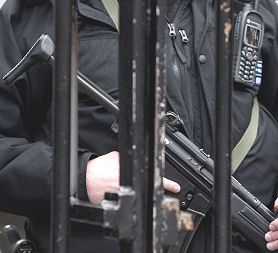MI5 chief: terrorists still want to attack UK
There are hundreds of new leads every month in the fight against Islamist terrorism, Simon Israel hears from the head of the UK’s security services, Jonathan Evans.

MI5’s director general Jonathan Evans said the agency still gets several hundred new leads on violent Islamist extremism and terrorism in the UK every month.
In a speech to security experts in the City of London, Mr Evans refused to give numbers on suspects or cells but said at any one time there are a handful of investigations where there’s the belief of a real possibility of a planned terrorist attack.
In 2009, he said the threat of an imminent attack had diminished, but he now warned: “the fact that there are real plots uncovered on a fairly regular basis demonstrates that there is a persistent intent on behalf of al-Qaeda and its associates to attack the UK.”
I am concerned that it is only a matter of time before we see terrorism on our streets inspired by those who are today fighting alongside Al Shabab. Jonathan Evans
However, Mr Evans describes the actual ability do so as “patchy”, with some of those being groomed never likely to make credible terrorists.
Pakistan-based plots he said were declining. US drones which have been used to kill Al Qaida leaders in Pakistan’s tribal areas are thought to have partly responsible for a 30 per cent drop in the number of planned attacks against UK.
Training camps in Yemen and Somalia
However he warned there had been shift to Yemen and Somalia, where a “significant” number of UK residents had travelled to Al Shabbab militia training camps.
The director general compared these to the camps in Afghanistan in the nineties when under Taleban rule.
A number of British residents were reported to have been killed in the Somali capital Mogadishu in the last ten days.
Mr Evans said: “I am concerned that it is only a matter of time before we see terrorism on our streets inspired by those who are today fighting alongside Al Shabbab.”
He further warned of a renewed threat from those who have been convicted and jailed over the last nine years since 9/11 but are now being released having served their sentence.
He said: “Experience has shown that it is very rarely the case that anyone who has been closely involved with terrorist-related activity can be safely taken off our list of potentially dangerous individuals; the tail of intelligence ‘aftercare’ gets increasingly lengthy.”
A call to leave the security budget alone?
While there maybe nothing startling new in what he said last night, it must be seen in the context of two things, writes Channel 4 News Home Affairs correspondent Simon Israel.
Firstly, next month will see the start of the inquest into the 7 July London suicide bombings, where the fallibilities of the security services will be in the public spotlight again over the failure to monitor Mohammed Siddique Khan and others the year before.
The director general pointed out in his speech that it was nonsensical to think that terrorism is 100 per cent preventable, and that any incident that is not prevented is seen as a culpable government failure.
Secondly the Government's set to publish the results of its review of counter terrorism powers including the use of control orders, and the limits on pre-charge detention.
Home Secretary Teresa May said in May the aim was to restore ancient civil liberties.
But MI5's chief said last night "...it is a sad fact that for all sorts of good reasons terrorist threats can still exist which the English criminal justice system cannot reach. The government cannot absolve itself of the responsibility to protect its citizens just because the criminal law cannot, in the particular circumstances, serve the purpose."
It's understood that while cuts are taking place, reductions are nowhere near the 25 per cent figure demanded of other government departments and agencies.
-
Latest news
-
As India goes to the polls in the world’s largest election – what do British-Indians think?6m

-
Tees Valley: Meet the candidates in one of the biggest contests coming up in May’s local elections4m

-
Keir Starmer says public sector reform will be a struggle7m

-
Nicola Sturgeon’s husband Peter Murrell charged with embezzlement of funds from SNP1m

-
Ukraine might finally get $60billion in American weapons and assistance to defend against Russia3m

-




